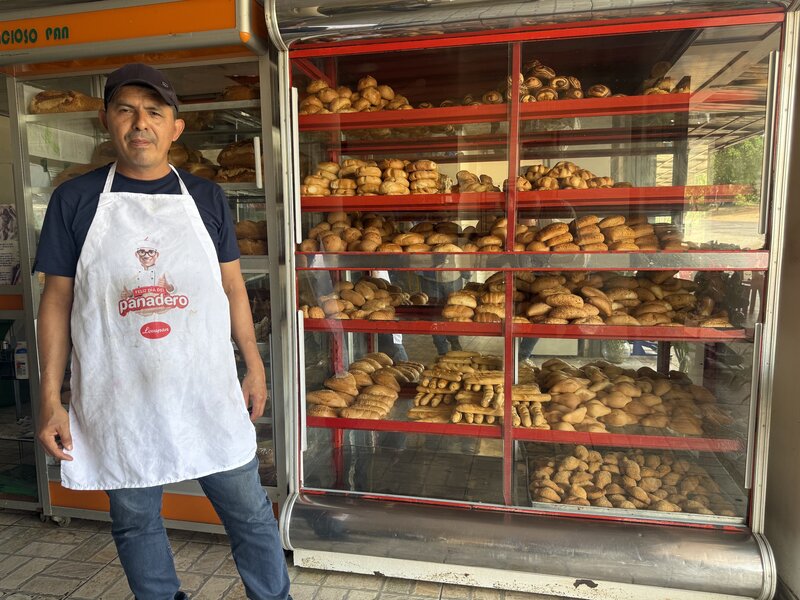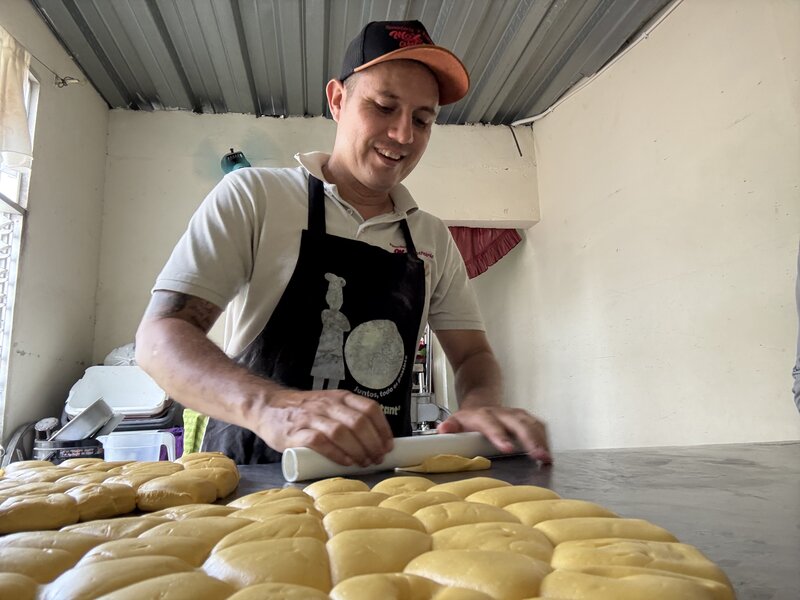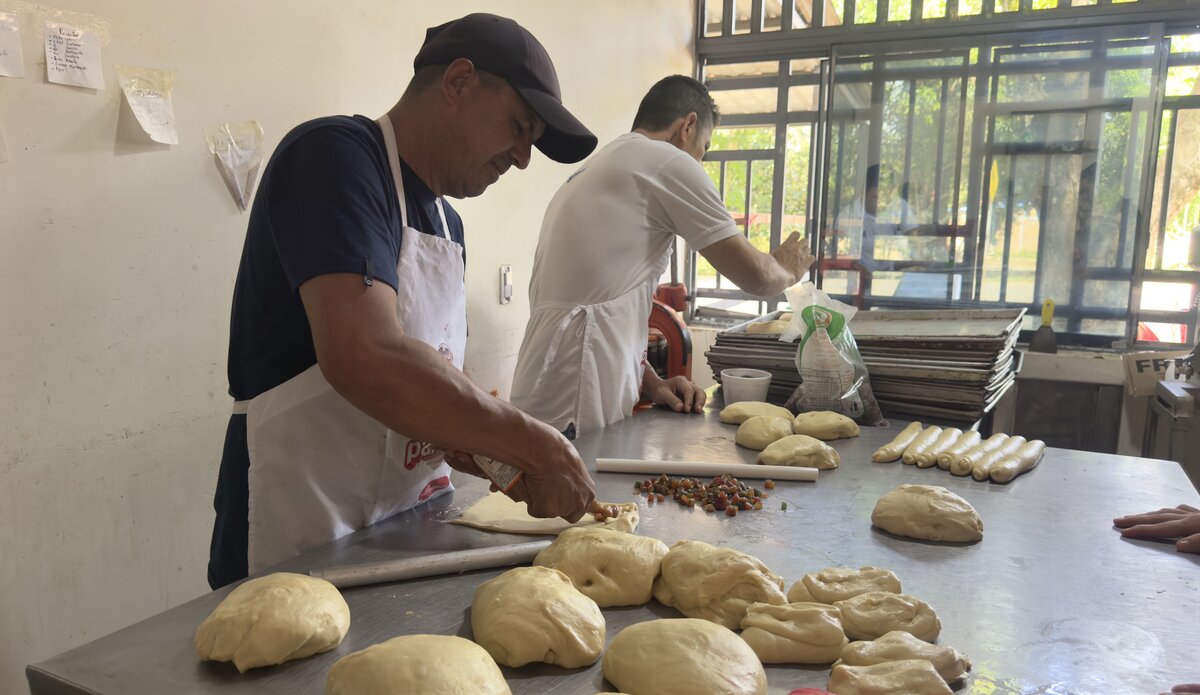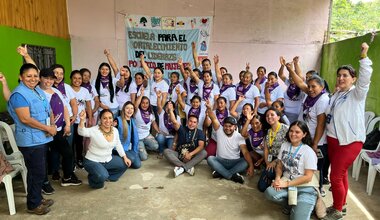Bread is a symbol of peace: The endeavors of peace signatories in Caquetá
In a region long scarred by violence and conflict, the sound of gunfire has been replaced by the inviting and transformative aroma of bread hot from the oven. This is the story of Alex and Federmán, two brothers who left war behind to become entrepreneurs and leaders in peacebuilding.
After the signing of the Peace Agreement in 2016, Alex and Federmán, two brothers from Paujil, Caquetá, found in baking not only an art form but also a path to rebuild their lives away from the armed conflict.
The brothers were in the FARC-EP guerrilla, and both were imprisoned on charges of rebellion. However, following the Agreement, they regained their freedom and began their reintegration process independently, far from the reintegration spaces, but firmly determined to live their lives lawfully.
Alex, the eldest, initially invested the eight million pesos he received for a productive project under the Agreement, but his business ultimately failed. Undeterred, he turned to his true passion: baking, a craft he had learned decades earlier.
His love for baking was so strong that, after spending 18 months selling bread to order from his home, he opened his own bakery in a strategic location, in a neighbourhood on the outskirts of San Vicente del Caguán (Caquetá), where he has grown and thrived as a small business owner. Today, he runs a distribution network that supplies local stores and is considering opening a second location.
"We want to buy a van to expand our distribution network, hire more people, and open a second location to boost the municipality’s economy. We are doing all this for our children, for our community, and for peace," he said, beaming with pride.

The change is already evident in his family: his son now attends university, a clear symbol of a new generation with a brighter future. He has also created more than six direct jobs, helping to strengthen the local economy.
Even his brother Federmán, who is also a peace signatory, was inspired to follow in his footsteps. With his brother’s guidance, Federmán also learned the art of baking.
"My brother taught me. I barely knew anything, but I used what he taught me to get a job in local bakeries, with the hope that one day I could start a business of my own," Federmán said.
After three years marked by sacrifice, debt, setbacks, sleepless nights, mistakes, and hard-won lessons, Federmán continues his reintegration process alongside his wife in their own bakery. He took out two loans that he is still repaying and has yet to benefit from the programs available to signatories of the Peace Agreement. Even so, this father of two hopes to receive approval for a project that would help him grow his business. "I requested a generator, a refrigerator, and raw materials. Getting them would make a huge difference," he explained.
Over the last two years, Federmán has focused on consolidating his business. Thanks to his effort, the support of his family, and the loyalty of his customers, he recently acquired a rotary oven, which has allowed him to double his production capacity.
"We bake sandwich loaves and hamburger buns, and demand keeps growing. All of this is possible because of our commitment to peace. Now, we are building a future together with our families," he concluded.
The impact of reintegration
Eight years after the signing of the 2016 Peace Agreement, reintegration has taken on a new shape: 10,265 signatories now live outside the Territorial Training and Reincorporation Spaces (ETCRs), spread across more than 600 municipalities, from small towns to major cities. No matter where they are, the vast majority of them remain committed to peace.
According to government sources, more than 6,000 individual and collective productive initiatives have been approved across the country, benefiting more than 11,000 people. Estimates show that over 70% of these projects remain active. The agriculture, construction, commerce, fashion, and gastronomy sectors have all benefited from this transformation. In particular, baking has emerged as one of the most successful activities, thanks to its strong community ties, its potential to generate quick income, and its affordability.
Today, the vast majority of those who laid down their arms remain committed to the reintegration process. Of the nearly 14,000 former combatants initially accredited by the Office of the High Commissioner for Peace, including those who have died or are currently incarcerated, close to 12,000 are currently engaged with the Agency for Reintegration and Normalization and continue to benefit from its support. Of these, 27% are women.
Beyond the statistics, Alex and Federmán’s story captures the essence of peace and reconciliation: the chance to start anew, create decent jobs, foster healing, and strengthen long-marginalized communities. Their efforts reflect resolve, dedication, and a deep commitment to collective work. Stories like theirs remind us that peace is not just a goal but a daily endeavor: waking up early to knead the dough, persevering through economic hardship, and pushing back against prejudice. It is also a living process that transforms realities and restores hope where it is most needed. Building a different country also means, quite literally, bringing bread to the table.

By: Camilo Vargas Martínez
Public Information Officer - Florencia Regional Office
United Nations Verification Mission in Colombia (UNVMC)
 UN
UN





